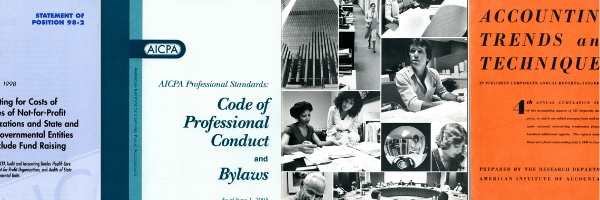
Exposure Drafts, Comment Letters, and Statements of Position
Files
Download Full Text (348 KB)
Description
The Federal Accounting Standards Advisory Board (FASAB) was organized in 1991 by the United States Department of the Treasury, the United States Office of Management and Budget, and the United States General Accounting Office to establish financial accounting and reporting standards for federal governmental entities. On October 19, 1999, AICPA Council adopted a resolution recognizing the FASAB as the body designated to establish generally accepted accounting principles (GAAP) for federal governmental entities under Rule 203, "Accounting Principles," of the AlCPA's Code of Professional Conduct. Members may now express an opinion that the financial statements of a federal governmental entity are in conformity with GAAP if they are prepared in conformity with accounting principles promulgated by the FASAB. Pursuant to the resolution, Statements of Federal Financial Accounting Standards issued by the FASAB since March 1993 are recognized as GAAP for the applicable federal governmental entities. AICPA Council's action came after an evaluation of the FASAB structure and processes based on Council-approved criteria used to assess standards-setting bodies designated to establish accounting principles under rule 203. As resolved, the AlCPA's Board of Directors will, within five years of adoption of the resolution, review the mission and operations of the FASAB and evaluate whether the FASAB continues to meet the aforementioned Council-approved criteria for standards-setting bodies. In response to the Council resolution, the AICPA Auditing Standards Board approved this exposure draft of a proposed Statement on Auditing Standards (SAS). The proposed SAS would amend SAS No. 69, The Meaning of Present Fairly in Conformity With Generally Accepted Accounting Principles in the Independent Auditor's Report (AICPA, Professional Standards, vol. 1, AU sec. 411) to reflect FASAB pronouncements in the GAAP hierarchy as sources of established accounting principles. SAS No. 69 explains the meaning of the phrase "present fairly...in conformity with generally accepted accounting principles" in the independent auditor's report. Specifically, SAS No. 69 defines sources of established accounting principles that are generally accepted in the United States. Four categories of such sources, commonly known as the GAAP hierarchy, are defined in the SAS. The proposed amendment to SAS No. 69 reflects FASAB pronouncements in the GAAP hierarchy as sources of established accounting principles, in effect defining a GAAP hierarchy for federal governmental entities. This statement amends SAS No. 69, The Meaning of Present Fairly in Conformity With Generally Accepted Accounting Principles in the Independent Auditor's Report (AICPA, Professional Standards, vol. 1, AU sec. 411).
Publication Date
1999
Relational Format
Book
Keywords
Auditing -- Standards -- United States; Accounting -- Standards -- United States; Auditors' reports --Standards -- United States
Disciplines
Accounting | Taxation
Recommended Citation
American Institute of Certified Public Accountants. Auditing Standards Board, "Proposed statement on auditing standards : amendment to statement on auditing standards no. 69, The Meaning of "Present fairly in conformity with generally accepted accounting principles" in the independent auditor's report;Amendment to statement on auditing standards no. 69, The Meaning of "Present fairly in conformity with generally accepted accounting principles" in the independent auditor's report;Meaning of "Present fairly in conformity with generally accepted accounting principles" in the independent auditor's report; Exposure draft (American Institute of Certified Public Accountants), 1999, Nov. 29" (1999). Exposure Drafts, Comment Letters, and Statements of Position. 653.
https://egrove.olemiss.edu/aicpa_sop/653



Comments
Originally published by: American Institute of Certified Public Accountants; Copyright and permission to reprint held by: American Institute of Certified Public Accountants.